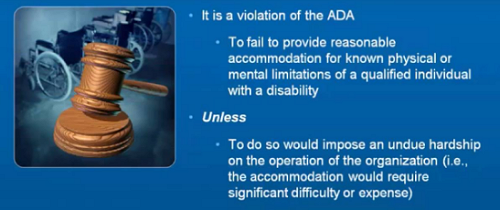Website accessibility test for ADA Title III compliance

You've probably seen warnings about website accessibility litigation like this one from law resource website jdSupra.com:
“The number of ADA Title III lawsuits filed against businesses nationwide continues to increase. In 2020 alone, approximately 11,000 ADA Title III lawsuits were filed in federal courts. While ADA Title III lawsuits have traditionally focused on physical accessibility elements (handicap parking, restroom accessibility, etc.), websites are now a prime target for accessibility claims. ADA Title III website accessibility claims are typically brought by individuals with visual impairments or other disabilities who allege they are unable to use a business's website due to incompatibility with screen reader software or other accessibility issues. The number of website accessibility lawsuits has increased over 200% since 2017. In 2020 alone, over 2,000 lawsuits were filed against businesses alleging ADA Title III violations related to website accessibility. The number of these claims is expected to grow in 2021 and beyond...Businesses of all sizes should make an effort to continually audit their websites for accessibility issues and ensure compliance with applicable requirements. ”
You're probably familiar with Americans with Disabilities Act Title III as it applies to physical spaces used by your customers, as mentioned above.
But what's this about website accessibility?
Here in a nutshell is what you need to know:

The Americans with Disabilities Act (ADA) Title III, which is enforced by the US Department of Justice (DoJ) prohibits discrimination on the basis of disability by almost any business that deals with members of the public.
Title III requires such businesses to “make reasonable modifications to facilities, policies, and procedures, and take other actions to enable disabled individuals to have equal access to the goods and services they offer.”
Because the ADA was enacted prior to widespread use of the internet, Title III and DoJ regulations do not specifically address the internet or provide guidelines for website compliance.
However: in 2018, the DoJ took the position that the ADA applies to the websites of businesses dealing with the public but that “absent the adoption of specific technical requirements for websites through rulemaking, [businesses] have flexibility in how to comply with the ADA.”

To address the issue of ambiguity as to how ADA Title III applies to websites, the World Wide Web Consortium (W3C) has created internationally recognized guidelines for website accessibility. These guidelines, set out in the W3C’s Web Content Accessibility Guidelines (WCAG), detail how to make Web content accessible to individuals with disabilities.
So: is your website accessible under the WCAG? If not, what needs fixing?
We can help you find out quickly, with an accessibility analysis of your website using WCAG tools.
To find out more about our Accessibility Testing process based on the WCAG standards, just complete and send the short form below and we'll send details promptly, with no cost or obligation on your part. All our work is fully guaranteed.
We promise to keep your e-mail address safe.
Risk-free 30-day trial: if after one month you're not totally satisfied, we’ll return all fees you’ve paid to us.
ACRO Global
Boothbay Harbor, Maine 04538
USA
Contact
Follow Us on Twitter ![]()
